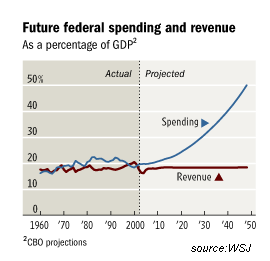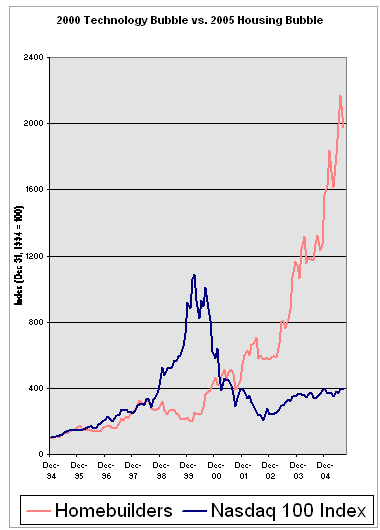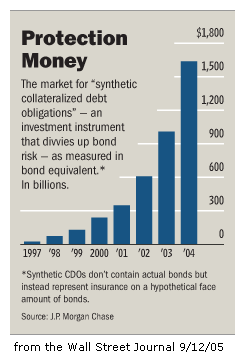

|
| weblog/wEssays archives | home | |
|
The Housing-Recession-Oil-Healthcare Connection (June 14, 2006)  As long-time readers of this modest site know, four topics consistently
dominate my wandering attention:
As long-time readers of this modest site know, four topics consistently
dominate my wandering attention:
(a.k.a. global recession) Is there a connection between these topics? You bet. Each crisis is unprecedented in scope and complexity, and each one will inevitably shape the future of the nation. First up is "entitlement spending," which as this chart shows, will soon begin rising so far above Federal revenue that national bankruptcy is unavoidable. The chief component of that out-of-control spending is Medicare/Medicaid--the Federal healthcare programs. We as a nation (and planet) simply cannot afford the sort of expensive and remarkably ineffective care we currently receive. As I have documented here many times, the health of U.S. citizens continues to decline even as we spend ever greater resources on healthcare. Clearly, something very basic in terribly amiss.  As for the global financial meltdown and the global housing bubble: unsurprisingly,
the two are interwoven to the point of being two sides of the same coin. As this chart
reveals, the current housing bubble makes the dot-com era Nasdaq bubble appear to be
a mild form of euphoria, a mere hill compared to the great mountain peak of the housing bubble.
As for the global financial meltdown and the global housing bubble: unsurprisingly,
the two are interwoven to the point of being two sides of the same coin. As this chart
reveals, the current housing bubble makes the dot-com era Nasdaq bubble appear to be
a mild form of euphoria, a mere hill compared to the great mountain peak of the housing bubble.
Along with many others, I have employed various metrics to measure the excesses in the housing market, and found each measure points to the same conclusion: an unprecedented concentration of assets, debt and risk has raised housing to unsustainably precarious heights. Consider "permanent growth story" China, which can do no wrong except be too successful; while average workers make $6,000 a year or less in the urban zones, an ordinary apartment in Shanghai sells for $240,000 (BusinessWeek). Non-elite, uneducated workers in China, of course, still earn $1,000 a year or less. Can you say "global housing bubble"?  As for the global financial system's precariousness--this chart displays just one
of many unprecedented risk factors. The central conceit of the global financial
system is this: risk can now be reduced to near zero, thanks to a dizzying array of
"financial instruments," a.k.a. derivatives.
Complex computer models can now track hundreds or even thousands of positions and
predict how the institution's holdings will fare in various scenarios.
As for the global financial system's precariousness--this chart displays just one
of many unprecedented risk factors. The central conceit of the global financial
system is this: risk can now be reduced to near zero, thanks to a dizzying array of
"financial instruments," a.k.a. derivatives.
Complex computer models can now track hundreds or even thousands of positions and
predict how the institution's holdings will fare in various scenarios.
Nice, but wrong. I endlessly encourage readers to go through Benoit Mandelbrot's The Misbehavior of Markets Please visit my archives for dozens of entries on the stupendous risks built into the global economy.  Then there's oil. Optimists like to claim that high prices are the result of
mere speculation and that the world is actually awash with the stuff. A closer examination,
however, suggests a more troubling reality: a basically permanent imbalance between
supply and demand.
Then there's oil. Optimists like to claim that high prices are the result of
mere speculation and that the world is actually awash with the stuff. A closer examination,
however, suggests a more troubling reality: a basically permanent imbalance between
supply and demand.
I highly recommend these books on the fundamental realities facing the global petroleum industry: Beyond Oil: The View from Hubbert's Peak The Party's Over: Oil, War and the Fate of Industrial Societies Twilight in the Desert: The Coming Saudi Oil Shock and the World Economy Again, please check my archives for more on the subject. The rising costs of oil extraction and the geopolitical risks of the world's remaining supergiant fields are essential contributors to the global financial system's precariousness. For more on this subject and a wide array of other topics, please visit my weblog. copyright © 2006 Charles Hugh Smith. All rights reserved in all media. I would be honored if you linked this wEssay to your site, or printed a copy for your own use. |
||
| weblog/wEssays | home |